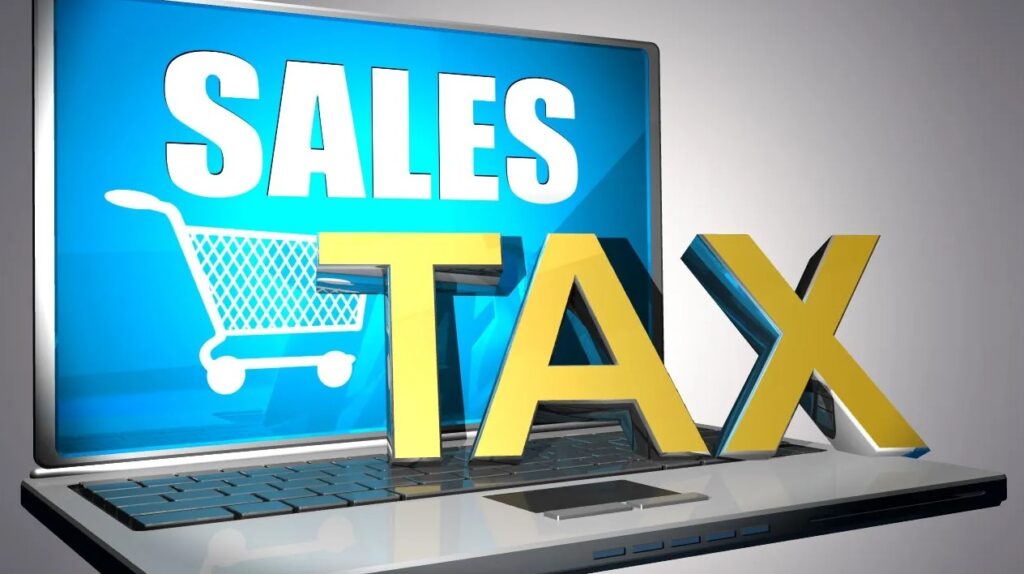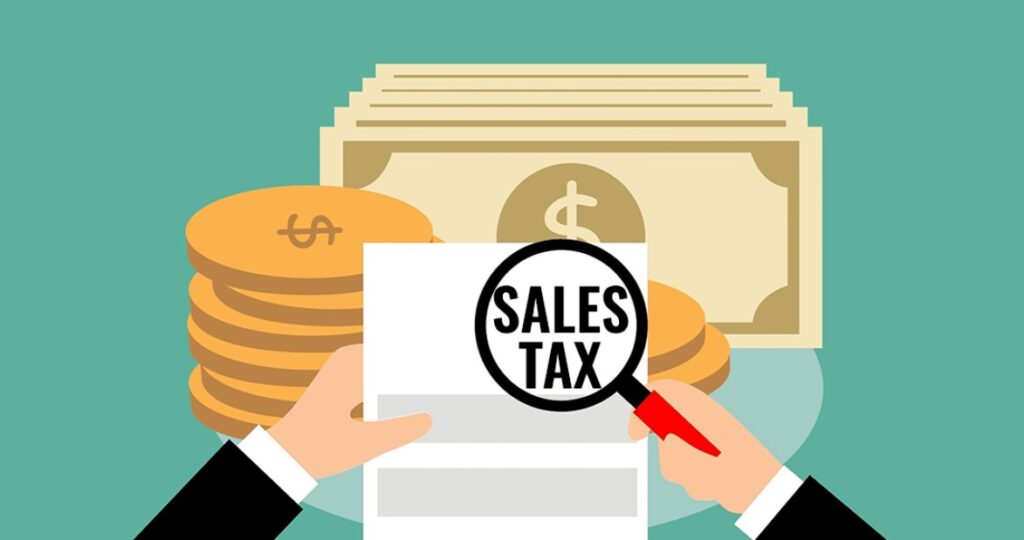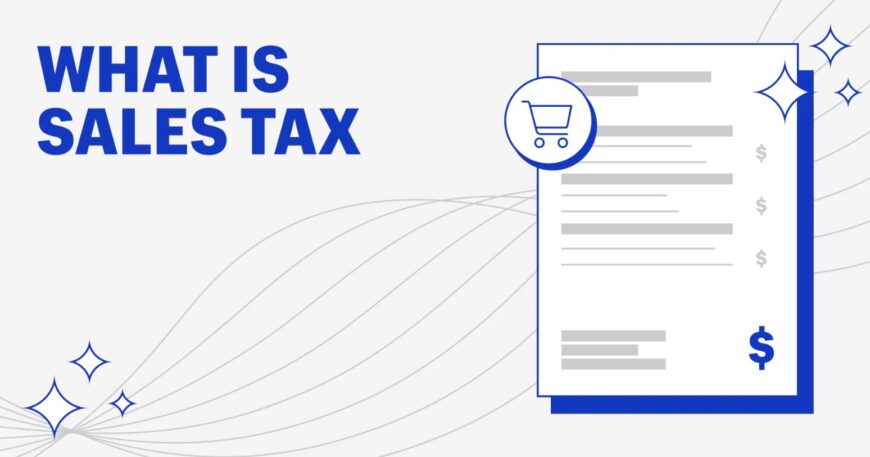Introduction
Sales tax can confuse many businesses and consumers, especially with varying rates across states and cities. Whether you are running a business or simply making purchases, it is essential to understand how sales tax works, how to calculate it, and how much you’ll pay. In this guide, we’ll briefly discuss sales tax in New Jersey (NJ), New York City (NYC), and New York State (NYS), offering insights on how to calculate Sales tax NJ and everything you need to know to stay compliant.

What is Sales Tax?
Sales tax is a consumption tax imposed by the government on the sale of goods and services. When you make a purchase, a percentage of the price is added as sales tax. The seller collects this tax and passes it on to the government. Understanding how sales-tax works in your area is essential for consumers and businesses to ensure compliance and avoid surprises.
Why Does Sales Tax Vary by Location?
Sales tax rates can vary not only by state but also by city or county. For example, New Jersey (NJ) and New York (NY) have different sales-tax rates; even within New York State, different counties can have additional taxes. As a consumer, the price of a product can change depending on where you purchase it.
Sales Tax in New Jersey (NJ)
The state government sets New Jersey’s sales tax. As of 2025, the state imposes a 6.625% sales tax on most goods and services. However, some exceptions, such as food sales, clothing, and prescription medications, are exempt from sales tax.
How Much is Sales Tax in NJ?
As mentioned, New Jersey has a state sales tax rate of 6.625%. However, some cities and counties in New Jersey may impose additional local taxes, raising the effective sales tax rate in those areas. For instance, some cities may add a local tax of 1%, increasing the total rate to 7.625%. It is important to check the specific location to determine the exact rate.
How to Calculate Sales Tax in NJ?
To calculate sales tax in New Jersey, multiply the item’s price by the sales tax rate. For example, if an item costs $100, the sales-tax would be $6.63 (100 x 6.625%). Therefore, the total price of the item with tax would be $106.63.
Sales Tax in New York City (NYC)
New York City has a higher sales tax rate than many other areas, with a combination of state, city, and metropolitan taxes. This layered tax system can be tricky to navigate, but it’s crucial for consumers and businesses in NYC.
How Much is Sales Tax in NYC?
In NYC, the total sales tax rate is 8.875%. This includes the state sales tax of 4%, the city sales tax of 4.5%, and an additional 0.375% for the Metropolitan Commuter Transportation District (MCTD). This high rate can significantly impact the cost of purchases in NYC compared to other areas.
How to Calculate Sales Tax in NYC?
To calculate the sales tax in NYC, multiply the item’s price by 8.875%. For example, if an item costs $100, the sales-tax would be $8.88 (100 x 8.875%), bringing the total price to $108.88.
Sales Tax in New York State (NYS)
New York State’s rate is slightly lower than New York City’s, but it still applies to most goods and services. The base state rate is 4%, but many counties and cities in New York State impose additional local sales taxes.
How Much is Sales Tax in NYS?
NYS’s base state sales tax rate is 4%, but it can increase depending on the local jurisdiction. Some counties, such as Westchester and Nassau, add a local tax, raising the total rate to 8% or higher. For example, Albany’s combined state and local rate is 8%, while other counties can increase to 8.875%.
How to Calculate Sales Tax in NYS?
Calculating sales tax in New York State follows a process similar to other states. Multiply the price of the item by the applicable sales tax rate. For instance, if an item costs $100 and the sales tax rate in your county is 8%, the sales tax would be $8 (100 x 0.08). The total price would then be $108.
How to Find Sales Tax Rates in Your Area
It’s important to check your local jurisdiction’s rates to stay informed about sales tax rates. Here are some resources that can help you find the sales tax rate for your area:
- State Websites: The New Jersey Division of Taxation and the New York State Department of Taxation and Finance provide up-to-date sales-tax rate information.
- Local Resources: Many cities and counties provide sales tax rates on their official websites or through local government offices.
- Tax Calculation Tools: Various online tools and apps can help you quickly calculate sales-tax, taking into account your location.

How to Calculate Sales Tax
Calculating sales tax is relatively simple once you understand the rates. The formula for calculating sales tax is as follows:
Sales Tax = Price of Item x Sales Tax Rate
For example, if you are purchasing an item for $50 in New Jersey (with a 6.625% sales tax rate), the sales tax would be:
50 x 0.06625 = $3.31
The total price would then be:
$50 + $3.31 = $53.31
How to Handle Sales Tax for Your Business
If you are a business owner, understanding how to collect and remit sales tax is crucial for maintaining compliance. You must ensure that you charge the correct rate based on where the sale occurs and the product sold.
Here are a few tips for handling sales tax as a business owner:
- Register for a Sales Tax Permit: Businesses must register with the state tax authority before collecting sales tax.
- Collect the Correct Rate: Ensure you are charging the correct rate for the location of your sale.
- Remit Sales Tax: Businesses are required to periodically remit collected sales tax to the state and local tax authorities.
- Keep Records: Proper record-keeping ensures you can easily file taxes and respond to audits if necessary.
FAQs About Sales Tax
- What is sales tax, and why do I have to pay it?
Sales tax is a government-imposed tax on the sale of goods and services. Consumers pay it when purchasing items, and businesses collect and remit the tax to the government. - How do I calculate the sales tax on my purchase?
To calculate sales tax, multiply the item’s price by the applicable tax rate. For example, for a $50 item with a 7% sales tax rate, the sales tax would be $3.50. - Is sales tax the same in all states?
No, sales tax rates differ from state to state and can also vary within states. It’s important to check your local jurisdiction to understand your charges. Will sales tax be waived for certain items? - Some items like food, clothing, and certain medications may be exempt from sales tax in some states or localities.
- Do I pay sales tax on online purchases?
Sales tax on online purchases depends on the seller and the buyer. Sometimes, you may have to pay sales tax based on your state’s sales tax. How often do I need to remit sales tax as a business owner? - The frequency of remitting sales tax depends on your state and sales volume. Generally, businesses are required to remit sales tax monthly, quarterly, or annually.
Conclusion
Sales tax can be tricky, especially with varying rates across states and cities, whether you are a consumer or a business owner. Understanding how sales tax works and how to calculate it is crucial for making informed financial decisions. If you need help with sales tax compliance or have specific questions about how it affects your business. Don’t hesitate to contact professionals like Syed Professional Services for expert guidance.
Understanding Sales Tax for Online Transactions
With the increasing number of online purchases, understanding sales tax for e-commerce is essential for both consumers and businesses. When you buy something online, sales tax can vary based on the seller and the state in which the buyer resides. This is because of a concept known as economic nexus, where businesses must collect sales tax if they have a significant presence or sales in a particular state.
Sales Tax on Online Purchases in NJ, NYC, and NYS
For residents of New Jersey, New York City, and New York State, sales tax on online purchases is determined by the location of the buyer. Here’s a Here’s own:
- New Jersey (NJ): Online purchases in New Jersey are subject to the state’s sales tax rate of 6.625%, even if the seller is located outside the state.
- New York City (NYC): If you’re purchasing from a retailer that ships to NYC, you will be charged the full 8.875% sales tax rate.
- New York State (NYS): Online purchases for NYS residents will incur the state’s tax rate of 4%, but local taxes may also apply depending on the county.
As a business owner selling online, you must collect the appropriate sales tax based on the buyer’s address. If your business operates in multiple states, it’s crucial to understand where to collect and remit sales tax to stay compliant.
Common Sales Tax Mistakes to Avoid
Navigating sales tax can be complex, and mistakes can lead to costly fines and audits. Here are some common errors to avoid:
- Charging the Wrong Sales Tax Rate
It’s important to apply the correct sales tax rate based on the location of the sale. Don’t assume that the tax rate is uniform across a state; local taxes can significantly affect the total sales tax. - Not Collecting Sales Tax on Taxable Products
Some businesses may overlook items subject to sales tax, especially if those items fall under special categories like digital goods, software, or services. Be sure to review your state’s taxes to understand what is taxable. - Failing to Register for a Sales Tax Permit
In many states, businesses must register with the state’s tax authority before collecting sales tax. Failure to do so can result in penalties. - Neglecting to File and Pay Sales Tax on Time
Missing sales tax deadlines can result in fines and interest. To avoid penalties, file your sales tax returns on time and remit payments promptly.
Tax Exemptions and Special Sales Tax Rules
Some goods and services are exempt from sales tax, or special rules may apply to certain types of transactions. Here are some common exemptions to be aware of:
- Clothing: In New Jersey, clothing is generally exempt from sales tax, though certain luxury items may be taxed.
- Food: Many states, including New Jersey and New York, exempt food for human consumption from sales tax, but prepared foods (e.g., restaurant meals) may still be taxed.
- Prescription Drugs and Medical Equipment: NJ and NY provide exemptions for prescription drugs and certain medical devices.
- Sales Tax Holidays: Some states, like New Jersey and New York, occasionally hold sales tax holidays where certain items are exempt from tax for a limited time.
As a business owner, you must know of any changes to sales tax exemptions or new sales tax holidays that might apply in your state.
How to Stay Compliant with Sales Tax Laws
Sales tax compliance can seem daunting, but staying organized and informed can help avoid issues. Here are some steps businesses can take to ensure compliance:
- Stay Up-to-Date: Sales tax laws change frequently. Ensure you know of any changes to rates, exemptions, or new tax regulations in your state and local area.
- Use Sales Tax Software: Many businesses rely on sales tax software to automate calculating and remitting taxes. These tools can help ensure that the correct rate is applied to each transaction and that your sales tax returns are filed correctly.
- Consult a Tax Professional: If you are unsure how to handle sales tax, it’s a good idea to consult a tax professional or accountant who can help you navigate the complexities of sales tax compliance.
- Review Your Records: Regularly audit your sales tax records to ensure that you are collecting and remitting the correct amount of tax.

Understanding Sales Tax Audits and Penalties
Understanding how to manage sales tax audits and avoid penalties is essential for businesses. Sales-tax audits are a routine process conducted by state and local tax authorities to ensure that businesses comply with tax regulations. Failure to collect or remit the proper sales-tax amount could trigger an audit, resulting in potential fines and penalties.
What Triggers a Sales Tax Audit?
Several factors may trigger a sales-tax audit, including:
-
Inaccurate Reporting: Reporting sales-tax inaccurately or inconsistently may prompt an audit. This could involve failing to report all taxable sales or using the wrong tax rates.
-
Large Transactions: Tax authorities may scrutinize your records more closely if your business processes high-volume transactions.
-
Unusual Tax Deductions: Excessive tax deductions or exemptions may raise red flags for tax auditors.
-
Failure to File Sales-Tax Returns: Missing or late filing of your sales-tax returns may trigger an audit.
Sales-Tax Penalties and Fines
Failure to comply with sales-tax regulations can lead to significant penalties. These can vary by state but typically include:
-
Late Filing Penalties: If you miss the deadline to file your sales-tax returns, you may face a penalty of up to 10% of the amount owed, depending on how long the return is overdue.
-
Underreporting Sales: If your business underreports its sales, the tax authority may impose penalties ranging from 5% to 25% of the underreported amount, plus interest.
-
Failure to Collect Sales Tax: If your business fails to collect sales-tax when required, the state may assess the unpaid sales-tax and additional penalties and interest.
Final Thoughts on Sales-Tax NJ, NYC, and NYS
Sales-tax is critical to business and purchasing in New Jersey, New York City, and New York State. By understanding the rates, exemptions, and how to calculate sales -ax, you can make informed decisions and avoid any unpleasant surprises. Whether you’re a business owner or a consumer, keeping track of sales-tax can save you time, money, and potential legal issues.
If you need help navigating sales-tax laws, Syed Professional Services is here to assist you. Our team of experts can help you understand your business’s or personal sales-tax requirements. Transactions and ensure that you remain compliant with state and local regulations.
What Syed Professional Services Can Do for You:
- Sales Tax Consultation: They can guide businesses through understanding and calculating sales-tax in various states and cities, ensuring that companies comply with local tax laws.
- Tax Filing and Remittance: Syed Professional Services can assist in preparing and filing sales-tax returns, ensuring that your business meets all deadlines and avoids penalties.
- Tax Strategy and Optimization: If you’re a business owner, Syed Professional Services can help optimize your sales-tax strategy by identifying tax-saving opportunities and navigating multi-state taxation complexities.
- Audit Representation: In a tax audit, Syed Professional Services can represent businesses during the audit process, ensuring that all documentation is in order and guiding you through any potential challenges.
- Nexus Determination: They can help businesses determine if they have economic nexus in other states, which might require sales-tax collection, and assist with registration and compliance.
- E-commerce and Online Sales-Tax Advice: For businesses selling online, Syed Professional Services can help navigate the complexities of e-commerce sales tax, including managing sales tax for out-of-state transactions and using automation tools for tax collection.
- Personal Tax Services: Whether you’re an individual or a small business owner, Syed Professional Services can offer tax services, ensuring you make the most of tax deductions and credits while remaining compliant with federal and state tax laws.
- Professional Tax Preparation: They can assist in preparing personal or business tax returns, ensuring all required forms are filled out correctly and that you’re receiving your tax refund (if applicable).
Syed Professional Services can provide comprehensive tax advice, filing, strategy, and representation. Ensuring compliance with regulations while optimizing your tax situation.




